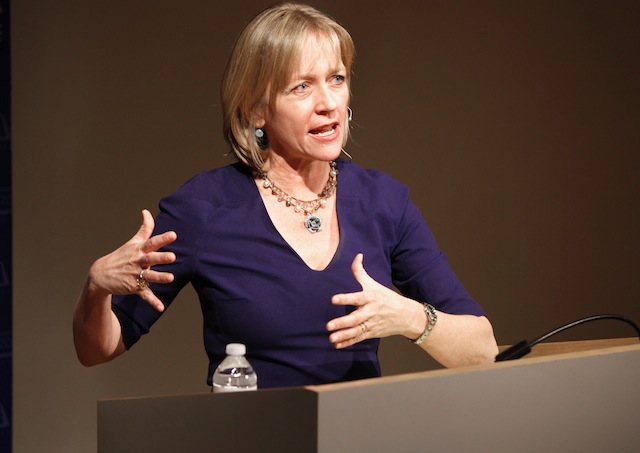
“Do women become bad wives and unpleasant partners when they have not only a room of their own but an income of their own?” asked journalist Liza Mundy, who was speaking to a large audience at MOCA Grand Avenue. “And, in the event that their income exceeds that of their partner, do they become even more domineering and unpleasant?”
The questions seemed more funny than provocative, and yet Mundy, author of The Richer Sex: How the New Majority of Female Breadwinners Is Transforming Sex, Love and Family, opened her talk with them, and asked the audience to think seriously about the consequences of women out-earning men.

Today, it’s easy to forget that, in the U.S., the U.K., and many other countries, up until the late 19th century, when a woman got married, the ownership of all her property, and even her wages, went to her husband. And even after these laws were changed, similar notions persisted into the early 20th century. Women’s earnings were suppressed, married women were prevented from doing certain jobs, and other jobs were reserved for men, all under the idea that, “if a woman were to have too much money she would become unpleasant,” said Mundy. In the 1950s, marriage was understood as a deal: the man does the earning, while the wife brings other things to the table, like managing the house, looking beautiful, or providing sexual services. Evolutionary biologists supported this theory by arguing that it was the natural state.
In the past few decades, all of this has changed. Women make up 57 percent of college students, and “in most American cities now, single women under 30 out-earn their male peers.” Almost 40 percent of married working women out-earn their husbands–up from under 25 percent in 1987. “If you plot this out,” said Mundy, “you’ll see that in 2030 a majority of working wives would out-earn their husbands.” And these trends coincide with an explosion in single motherhood, which means that very soon we may be looking at a society of female breadwinners.
Economically empowered women are freer to leave unhappy marriages or not enter marriages that are unsatisfactory. Mundy spoke with many young women who talked about watching their mothers suffer through bad marriages because they couldn’t afford not to. This propelled their daughters to get educated and become financially secure, particularly in working-class communities.

Mundy also talked to many men who relished their new roles: fathers spending more time with their kids, husbands putting their wives through graduate school, and men offering to move to wherever their partners could get a job. Men are finding that not being the primary breadwinner can be liberating. But she also spoke with men who were unhappy. Young, working-class men, for example, are more likely to think of themselves as providers–but the jobs they relied on in the past are no longer there.
This shift is also changing the dating game. “It’s no longer possible for every female college graduate to marry a male college graduate because there aren’t enough to go around,” said Mundy. In an effort to find more educated men, some young women are even traveling to other cities to expand their dating pool.
But Mundy believes that as men and women alike adjust to this new world, both sexes will find that it offers more flexibility. “Economic empowerment makes women actually happier partners, and more benevolent and less resentful,” she concluded. “I feel like we’re moving into a very happy new world order.”

The question-and-answer session addressed current events as well as more personal subjects. What effect has the current recession had on these trends? Seventy-five percent of the jobs lost have been men’s jobs. Yet women haven’t caused the decline of the fortunes of men, Mundy argues–they’ve in fact kept them from declining further by supporting their households.
She also believes that the current debate over contraception is related to this shift. In the 1970s and 1980s, more women started going to college not just because more universities opened their doors to them, but also because, with the pill, they were less likely to find their education interrupted by an unplanned pregnancy.
One audience member said she was part of the trend of women marrying later but admitted that she still liked having a man pay for things. Would women, in order to secure independence, have to forego all traditional male courtesies and contributions? Mundy said she thinks men and women will find other ways to preserve certain traditional courtship roles, whether it’s men helping women into their coats or men driving cars that may not belong to them, in order for men to assert their masculinity. Stuff like that, Mundy noted, still “does seem to be an important ingredient in a romantic relationship.”
Watch full video here.
See more photos here.
Buy the book: Skylight Books, Amazon, Powell’s.
Read opinions by observers of changing gender roles on what happens to men when women earn more here.
*Photos by Aaron Salcido.




Send A Letter To the Editors